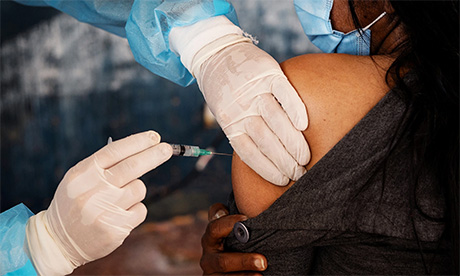Worries that the COVID-19 vaccine could cause infertility are among the reasons people give for avoiding vaccination.
While there’s no evidence any of the COVID-19 vaccines cause problems with fertility, becoming severely ill from the disease has the potential to do so, reproduction experts say, making vaccination all the more important.
“There is evidence to suggest that infection with SARS-CoV-2 has the potential to impact both male fertility, female fertility, and certainly the health of a pregnancy of someone infected,” said Dr Jennifer Kawwass, a reproductive endocrinologist and associate professor at the Emory University School of Medicine in Atlanta.
“And there is simultaneously no evidence that the vaccine has any negative impact on male or female fertility.”
Researchers have been studying the effects of COVID-19 on the human reproductive system since the beginning of the pandemic.
While there’s no evidence that COVID-19 can be sexually transmitted, research suggests that the cells in the reproductive system are feasible targets for the virus, because they carry some of the receptors the coronavirus must bind to in order to enter cells.
The idea that a virus could cause infertility is not unprecedented.
“We do have historic evidence that there are certain viruses that are more likely to impact either male or female fertility,” Kawwass said.
For example, human papillomavirus (HPV), hepatitis B, hepatitis C and HIV infections have all been linked to decreased fertility.
It’s unclear, however, if a respiratory virus, like the coronavirus, could have the same effect.
But the fact that male and female reproductive organs have the receptors the COVID-19 virus targets means it’s certainly plausible that the virus could cause fertility issues, she said.
Moreover, the symptoms of COVID-19 — primarily fever higher than 102 degrees Fahrenheit for at least three days — are known to cause fertility issues, especially in men.
According to a recent review paper published in the journal Reproductive Biology, moderate to severe COVID-19 infections have caused decreased sperm count, testicular inflammation, sperm duct inflammation and testicular pain in men of reproductive age.
Although not considered common complications of COVID-19 in particular, these effects are often associated with reduced fertility, and are enough to lead scientists to hypothesize that COVID-19 may cause fertility issues in men, warranting further research in this area.
Dr Eve Feinberg, a reproductive endocrinologist and associate professor at Northwestern University, works with patients with fertility issues every day.
She said although she doesn’t think the virus itself directly leads to infertility, she’s noticed that some of her male patients have experienced infertility due to low sperm counts after having COVID-19.
“But, it’s too early and very hard to say whether or not they had a low sperm count prior to COVID infection,” she added.
The symptoms of the disease, rather the virus itself, maybe the culprit when it comes to causing fertility issues.
“Any infection, particularly an infection that involves fever, can affect sperm production and can affect ovulation,” said Dr Marcelle Cedars, reproductive endocrinologist and director of the University of California, San Francisco, Center for Reproductive Health.
There’s no evidence that COVID would be different from that, she said.
Most of the research on COVID-19 and its effects on fertility have focused on men, but few studies in women have found that neither the virus nor its symptoms seem to have a major impact on menstruation or hormone cycles. Continue reading
